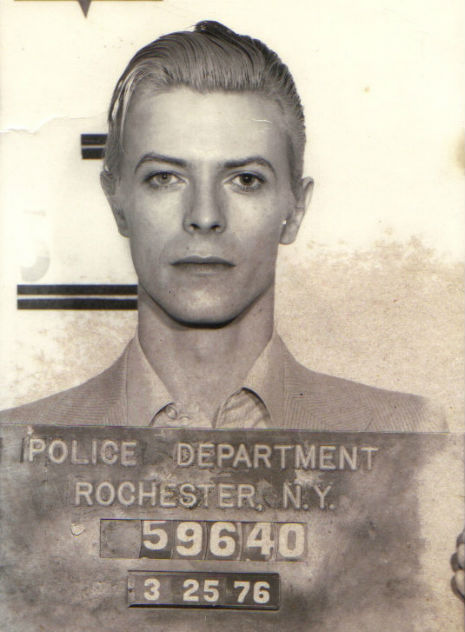
David Bowie: The Unflappable Icon During a Felony Arrest
Even in the face of adversity, David Bowie always managed to exude an extraordinary level of cool. This was evident even when he found himself booked on a felony charge.
The Isolar Tour and The Thin White Duke
In early 1976, Bowie embarked on his “Isolar” tour, adopting the enigmatic persona of the Thin White Duke. This character, which Bowie described as “a very Aryan fascist type — a would-be romantic with no emotions at all,” was an intriguing addition to his multifaceted career. Bowie’s close friend and occasional collaborator, Iggy Pop, joined him on this journey.
The Felony Arrest in Rochester
In the early hours of March 21, following a performance at the Community War Memorial Arena in Rochester, New York, Bowie and his entourage experienced a significant event. Vice squad detectives and a state police investigator searched his three-room suite at the Americana Rochester Hotel. According to the Rochester Democrat and Chronicle, they discovered 182 grams (over 6.4 ounces) of marijuana. Bowie, Iggy Pop, a bodyguard named Dwain Voughns, and a Rochester woman named Chiwah Soo were charged with fifth-degree criminal possession of marijuana, a Class C felony with a potential 15-year prison sentence.
Bowie and Pop, booked under their real names (David Jones and James Osterberg Jr.), spent the remainder of the night in Monroe County Jail and were released on $2,000 bond each by 7 a.m. Though expected to be arraigned the following day, Bowie continued to his next concert in Springfield, Massachusetts. His lawyer sought the court’s leniency due to the significant penalties associated with breaking concert commitments, and assured that Bowie would return the following morning, March 23.
The Courtroom Appearance
Bowie arrived at his arraignment looking stately in his Thin White Duke attire. The iconic mugshot was taken at this moment, forever documenting his composed demeanor. Shielded by police from a mass of fans, Bowie was escorted through back corridors of the courthouse. Reporter John Stewart from the Democrat and Chronicle detailed the scene:
Bowie and his group ignored reporters’ shouted questions and fans’ yells as he walked in — except for one teenager who got his autograph as he stepped off the escalator.
His biggest greeting was the screams of about a half-dozen suspected prostitutes awaiting arraignment in the rear of the corridor outside the courtroom.
Asked for a plea by City Court Judge Alphonse Cassetti to the charge of fifth-degree criminal possession of a controlled substance, Bowie said, “not guilty, sir.” The court used his real name — David Jones.
He stood demurely in front of the bench with his attorneys. He wore a gray three-piece leisure suit and a pale brown shirt. He was holding a matching hat. His two companions were arraigned on the same charge.
The defense lawyer elaborated that Bowie and his friends had no prior arrests. The judge allowed them to remain free on bond until a grand jury convened. Ultimately, the grand jury chose not to indict anyone involved. The incident faded into obscurity until a curious find by Gary Hess, who, while sorting through the estate of a retired Rochester police officer, discovered Bowie’s mugshot. Hess rescued the photograph and, in 2007, his brother sold it on eBay for $2,700.
Related Content:
- The Thin White Duke: A Close Study of David Bowie’s Darkest Character
- John Coltrane’s Naval Reserve Enlistment Mugshot (1945)
- David Bowie Predicts the Good & Bad of the Internet in 1999: “We’re on the Cusp of Something Exhilarating and Terrifying”
- Watch David Bowie Perform “Starman” on
Top of the Pops: Voted the Greatest Music Performance Ever on the BBC (1972)
(function(d){ var js, id = 'facebook-jssdk', ref = d.getElementsByTagName('script')[0]; if (d.getElementById(id)) {return;} js = d.createElement('script'); js.id = id; js.async = true; js.src = "https://connect.facebook.net/en_US/sdk.js"; ref.parentNode.insertBefore(js, ref); }(document));



